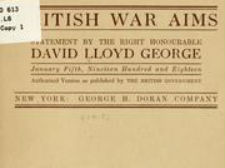On This Day
On This Day, 7 January 1918
On 07, Jan 2018 | In On This Day | By Nicola Gauld
Evening Despatch
Monday 7 January 1918
BRITAIN’S WAR AIMS
DEFINED IN DETAIL BY THE PRIME MINISTER
Mr. Lloyd George’s war-aims statement to the Man-Power Conference on Saturday was a carefully prepared speech. He had conferred with Mr. Asquith and Viscount Grey before he spoke, and Mr. Redmond had approved the matter of the speech. The following is a summary of the principal points of the speech:–
WHAT WE ARE NOT FIGHTING FOR.
The destruction or disruption of Germany or the German people. The destruction of Germany’s position for the future. The destruction of Austria-Hungary. To deprive Turkey of its capital or of “the rich and renowned lands of Asia Minor and Thrace.”
WHAT WE ARE FIGHTING FOR.
Complete restoration – political, territorial, and economic – of the independence of Belgium. Restoration of Serbia, Montenegro, and the occupied parts of France, Italy and Romania. The complete withdrawal of the alien armies, and the reparation for injustice done. Support “to the death” for France in the demand “for a reconsideration of the great wrong of 1871” in respect of Alsace-Lorraine. An independent Poland, comprising all those genuinely Polish elements who desire to form part of it. Genuine self-government to those Austro-Hungarian nationalities who have long desired it. Satisfaction of the legitimate claims of the Italians for union with those of their own race and tongue. Justice to men of Romanian blood and speech in their legitimate aspirations. The internationalisation and neutralisation of the passage between the Mediterranean and the Black Sea. Recognition of their separate national conditions for Arabia, Armenia, Mesopotamia, Syria, and Palestine. As regards the German colonies, the placing of the inhabitants under the control of administrations acceptable to themselves. Reparation for the injuries done in violation of international law. The establishment by some international organisation of an alternative to war as means of settling disputes. A just and lasting peace.



